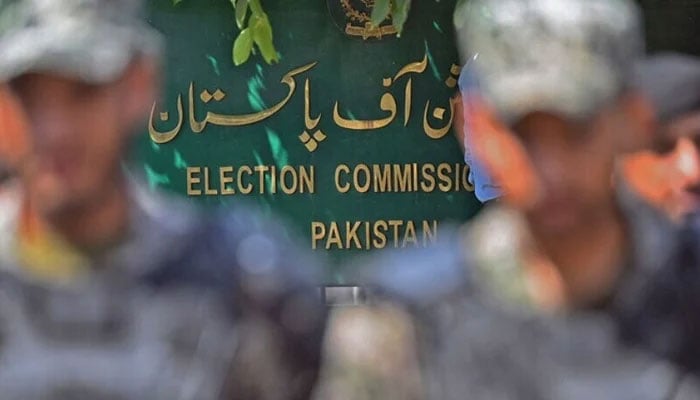Comment: Beyond irregularities — Recognizing ECP’s management of a mammoth election
Pakistan has established a global benchmark for large-scale democratic processes
ISLAMABAD: According to Freedom House, a non-profit organization that evaluates political rights and civil liberties worldwide, around 144 countries hold regular elections based on established standards. Only three or four countries conduct elections on a larger scale than Pakistan.
Therefore, let us commend the Election Commission of Pakistan (ECP), our police and our armed forces for successfully managing such a significant electoral process. The Election Commission of Pakistan (ECP) established 90,582 polling stations. Despite reports of alleged ‘irregularities’ from about 500 of these stations, let us commend the ECP for effectively managing the vast majority of the polling stations — roughly 90,000— in accordance with established standards.
Out of a total of 17,816 contesting candidates for the National Assembly and provincial assemblies, fewer than a dozen have filed petitions of complaints in the high courts. This indicates that the vast majority — approximately 17,800 — of contesting candidates did not encounter any major issues with the conduct of the elections.
There was significant outcry regarding the shutdown of the internet during this extensive electoral process. However, it’s crucial to consider the broader context: over the past year alone, there have been over 700 terrorist attacks, averaging more than two attacks per day. Notably, various countries impose restrictions on internet access during elections. This partial list includes India, Iran, Bangladesh, Vietnam, Turkey, Tajikistan, Venezuela, Russia, Belarus, Egypt, Sudan, Uganda, Ethiopia, Zimbabwe, Kazakhstan, Cameroon and Azerbaijan. In Pakistan, there was a notable outcry within the first 48 hours following the conclusion of voting due to the delay in election results. It’s worth noting that the Election Commission of India routinely takes up to 5 days after the final phase of voting to announce results. Similarly, in the US presidential election, result deadlines fluctuate, typically ranging from five to 36 days after the Election Day.
In December 2023, the ECP organized training sessions for approximately 859 Returning Officers (ROs). Out of this group, complaints have been lodged against fewer than a dozen ROs. This indicates that more than 98% of ROs carried out their duties in accordance with established standards.
Out of the 90,582 polling stations, fewer than a hundred reported incidents of major disruptions. This indicates that in over 99% of the polling stations, elections proceeded in accordance with established standards. Of the 144 countries that regularly hold elections, can anyone name a single country where losing candidates do not raise objections? Yes, our elections face more challenges than our fair share. Yes, we also encounter more naysayers than our fair share. The fact remains that Pakistan conducted a monumental election.
Demonstrating exceptional efficiency, with over 99% of polling stations operating without major disruptions, 98% of returning officers meeting standards, and only a few candidate complaints, Pakistan has established a global benchmark for large-scale democratic processes. Let us celebrate this milestone and acknowledge the commendable execution by the ECP, bolstered by the security umbrella provided by our police and our army. Together, let us continue to strengthen and fortify our democracy for all.
-
 'Mortified' Princess Eugenie, Beatrice Plan Interview To Finally Speak Truth In Sarah Ferguson, Andrew-Epstein Scandal
'Mortified' Princess Eugenie, Beatrice Plan Interview To Finally Speak Truth In Sarah Ferguson, Andrew-Epstein Scandal -
 Lewis Hamilton Spent Years Trying To Catch Kim Kardashian's Attention?
Lewis Hamilton Spent Years Trying To Catch Kim Kardashian's Attention? -
 Royal Strategy Revealed As King Charles, Prince William Issue Statements On Andrew Row
Royal Strategy Revealed As King Charles, Prince William Issue Statements On Andrew Row -
 Inside Will Smith's Struggle To Revive His Career After Infamous Oscar Incident
Inside Will Smith's Struggle To Revive His Career After Infamous Oscar Incident -
 What’s Coming Out Of Meghan Markle’s War Against Prince William? Inside People’s Unease
What’s Coming Out Of Meghan Markle’s War Against Prince William? Inside People’s Unease -
 Australia Seeks Urgent Meeting With Roblox Over 'Disturbing' Content Complaints
Australia Seeks Urgent Meeting With Roblox Over 'Disturbing' Content Complaints -
 Epstein Case: Ghislaine Maxwell Invokes Fifth, Refuses To Testify Before US Congress
Epstein Case: Ghislaine Maxwell Invokes Fifth, Refuses To Testify Before US Congress -
 Ferrari Luce: First Electric Sports Car Unveiled With Enzo V12 Revival
Ferrari Luce: First Electric Sports Car Unveiled With Enzo V12 Revival -
 Chappell Roan Parts Ways With Wasserman Music Over CEO's Ties With Epstein
Chappell Roan Parts Ways With Wasserman Music Over CEO's Ties With Epstein -
 Andrew Mountbatten Windsor Publically Shamed After Brother And Nephew Change Decades Old Royal Rule
Andrew Mountbatten Windsor Publically Shamed After Brother And Nephew Change Decades Old Royal Rule -
 Jon Stewart On Bad Bunny's Super Bowl Performance: 'Killed It''
Jon Stewart On Bad Bunny's Super Bowl Performance: 'Killed It'' -
 Savannah Guthrie Receives Massive Support From Reese Witherspoon, Jennifer Garner After Desperate Plea
Savannah Guthrie Receives Massive Support From Reese Witherspoon, Jennifer Garner After Desperate Plea -
 Celebrities Take Sides As Brooklyn Beckham’s Feud With David, Victoria Heats Up
Celebrities Take Sides As Brooklyn Beckham’s Feud With David, Victoria Heats Up -
 Prince Harry Reacts As Beatrice, Eugenie's Names Surface In Epstein Emails
Prince Harry Reacts As Beatrice, Eugenie's Names Surface In Epstein Emails -
 Cyprus Joins European AI Race: What It Means For Greek LLMs And Regional Innovation
Cyprus Joins European AI Race: What It Means For Greek LLMs And Regional Innovation -
 Amazon Soon To Launch 'AI Content' Marketplace, Says Report
Amazon Soon To Launch 'AI Content' Marketplace, Says Report




